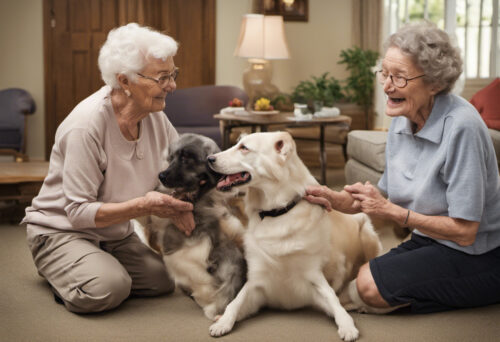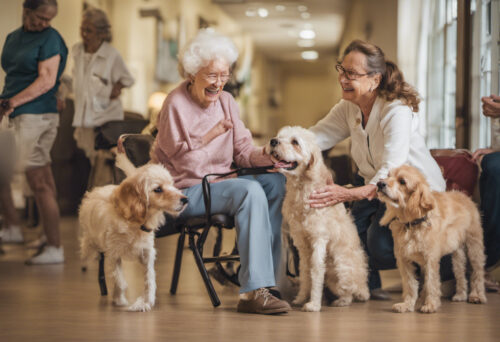With high-tailed anticipation and a forgiving bark, dogs can bring warmth and joy to assisted living facilities and play an instrumental role in elderly care. The benefits they introduce are many and varied – not only do they help seniors feel happier and less anxious, but they also help tackle feelings of loneliness, among other profound impacts. Dogs, it seems, are man’s best friend in more ways than we can possibly count.
The Therapeutic Effects of Dogs in Elderly Care
There’s a multitude of research on this subject area. According to the National Institutes of Health, companionship from dogs can assist in reducing stress, lowering blood pressure, and even increasing survival rates for those with heart conditions. This showcases the undeniably mighty influence dogs can have on the health and wellbeing of our beloved older adults.
Playing with Dogs = Playing with Serotonin and Dopamine
Believe it or not, enjoying the company of a fluffy friend can cause chemical changes in our brain! When we stroke a dog, our brain appreciates the contact and releases “happy hormones” such as serotonin and dopamine. These hormones can have a profound impact on our overall mood, often making us feel more relaxed and content. This becomes increasingly vital in senior care, as feelings of isolation and depression can be challenging issues.
Fight Loneliness with Furry Friendship
Coping with loneliness can be quite taxing. Studies suggest that humans, like dogs, are fundamentally social creatures. And that’s where our furry pals can be immensely helpful in an assisted living environment. Having a pet dog not only offers companionship to our seniors but also stimulates them socially, inciting conversations with fellow residents and caregivers. There are even studies suggesting that the presence of pets in a social gathering can increase the level of social interaction among individuals.
The Benefits Go Both Ways
Contrary to popular belief, the benefits of having dogs in elderly care and assisted living facilities are not one-sided. Residents certainly love their furry companions, but the pets, in turn, get an environment filled with care, attention, and lots of love. Often, these dogs are rescues that get another chance at a happy life.
In this human-animal synergy, seniors get a companion who vies for their attention, while the dogs receive a caring home – each providing companionship for the other. This forms a bond that is both emotionally satisfying and mutually enriching.
In conclusion, it’s essential for elderly care institutions to recognize and harness these benefits that dogs offer. From mental health enhancements to physical health incentives, the presence of pets in the life of the elderly makes a world of difference. And let’s not forget, it also paints a picture of a more positive, vibrant, and humane assisted living environment.

Rolling Out the Red Carpet for Dogs
For optimal benefits to ripple through a community, an assisted living facility needs to be adequately prepared for their new four-legged friends. According to the American Humane Association, there are several considerations when introducing pets into an elderly care environment, such as breed and size. Notably, dogs with a calmer demeanor are typically preferred in such settings, as they are less likely to cause any unwanted disruption.
Training Canine Companions for the Best Fit
The Canine Good Citizen program hosted by the American Kennel Club is a hugely popular initiative that focuses on training dogs for these moments. Dogs learn to respond to commands, behave well with different people, and deal with unfamiliar situations, ensuring they’re prepared to support and respond to the needs of our seniors.
The Answer May Be in Assistance Dogs
An even more specialized option is Assistance Dogs, intentionally trained dogs that offer specific services like guiding blind residents, fetching dropped items, signaling doorbells or smoke alarms, and more. They are known to provide functional assistance while also addressing emotional needs with their comforting presence.
The Joy of Dog-Focused Activities
Forget merely taking a walk; assisted living facilities can integrate dogs into a vast array of activities to spice up the everyday life of their residents. Activities such as grooming the dog, playing fetch, or even creating a dog scrapbook can be therapeutic, stimulating, and downright fun. Additionally, this gives residents a sense of responsibility and purpose, which fosters self-esteem.
Connecting Through Canine Stories
Fostering connections is no dog’s tale when it involves our furry friends. Residents could have “Share your dog story” sessions, where they reminisce about past experiences with dogs or share anecdotes about their canine companions in the facility. Shared stories of the heartwarming, humorous, and inspiring kind serve to bring people together, creating a tightly knitted community enhanced by the love for dogs.
In light of the compelling benefits dogs bring to an elderly care setting, it’s clear that they genuinely deserve the title: Man’s Best Friend. As more facilities open their doors to these four-legged friends, we pave the way for a healthier, happier, and holistic approach to elderly care.

Bark and Tails – The Gateway to Grins
Never underestimate the power of an affectionate lick or a tail wagging with joy. These simple actions can trigger laughter and happiness among seniors, proving that these four-legged creatures are, indeed, carriers of cheer. According to UC Davis Health, therapy dog interactions can significantly increase happiness levels and overall life satisfaction in seniors.
Affectionate Antidote for Anxiety
Seniors often grapple with anxiety triggered by various factors like loneliness or health concerns. There’s strong evidence that the simple act of petting a dog can alleviate anxiety. By stroking the fur of their canine companions, seniors can find a natural and therapeutic way to reduce anxiety and promote relaxation, as suggested by a study published in the American Journal of Alzheimer’s Disease & Other Dementias.
Unspoken Bond – A Ray of Hope
A dog’s ability to perceive human emotions has always been their superpower and this proves especially beneficial in elderly care where communication may sometimes be a challenge. Seniors with cognitive impairment or speech difficulties may find solace and connections in the silent yet profound relationships they form with dogs.
Turning the Pages – The Future of Dogs in Elderly Care
As we continue to uncover the benefits, the role of dogs in elderly care and assisted living facilities is expected to rise exponentially. Initiatives like the Shelter Pet Project are just one of many aiming to increase the adoption of shelter dogs, many of whom could become valuable additions to elderly care homes.
Trends in Assistance Dogs
While not new, there’s increasing interest in the use of assistance dogs in elderly care. Assistance Dogs International reports that the specialist training of dogs in this category is continuous and evolving as we understand more about the different ways they can improve the lives of seniors. This includes mobility assistance, memory support, and even pre-alerts for specific medical conditions.
Building ‘Dog-Friendly’ Facilities
To harness all these incredible benefits, it’s essential for assisted living facilities to refine their pet policies and build ‘dog-friendly’ environments. The American Horticultural Society provides fantastic tips on creating dog-friendly gardens that are safe and engaging spaces for both dogs and residents.
To wrap up, the benefits of having dogs in elderly care and assisted living facilities are truly unparalleled, bringing not only joy but also health and longevity to our beloved seniors. They offer more than just wagging tails and wet noses; they bring forth love, companionship, and a sense of belonging, making elderly care a nurturing and loving environment for all.



